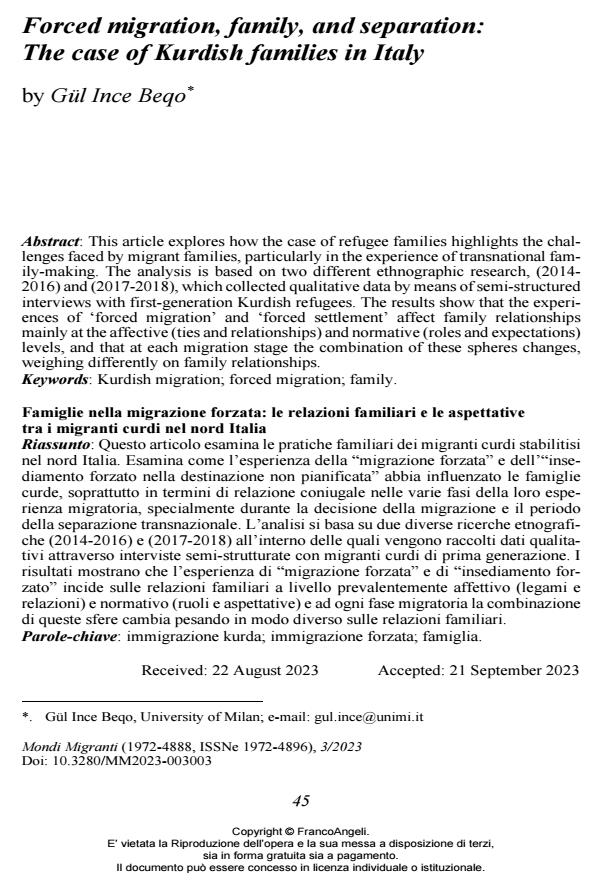Forced migration, family, and separation: The case of Kurdish families in Italy
Titolo Rivista MONDI MIGRANTI
Autori/Curatori Gül Ince Beqo
Anno di pubblicazione 2023 Fascicolo 2023/3
Lingua Inglese Numero pagine 14 P. 45-58 Dimensione file 237 KB
DOI 10.3280/MM2023-003003
Il DOI è il codice a barre della proprietà intellettuale: per saperne di più
clicca qui
Qui sotto puoi vedere in anteprima la prima pagina di questo articolo.
Se questo articolo ti interessa, lo puoi acquistare (e scaricare in formato pdf) seguendo le facili indicazioni per acquistare il download credit. Acquista Download Credits per scaricare questo Articolo in formato PDF

FrancoAngeli è membro della Publishers International Linking Association, Inc (PILA), associazione indipendente e non profit per facilitare (attraverso i servizi tecnologici implementati da CrossRef.org) l’accesso degli studiosi ai contenuti digitali nelle pubblicazioni professionali e scientifiche.
This article explores how the case of refugee families highlights the challenges faced by migrant families, particularly in the experience of transnational fami-ly-making. The analysis is based on two different ethnographic research, (2014-2016) and (2017-2018), which collected qualitative data by means of semi-structured interviews with first-generation Kurdish refugees. The results show that the experiences of ‘forced migration’ and ‘forced settlement’ affect family relationships mainly at the affective (ties and relationships) and norma-tive (roles and expectations) levels, and that at each migration stage the com-bination of these spheres changes, weighing differently on family relation-ships.
Questo articolo esamina le pratiche familiari dei migranti curdi stabilitisi nel nord Italia. Esamina come l’esperienza della “migrazione forzata” e dell’“insediamento forzato nella destinazione non pianificata” abbia influen-zato le famiglie curde, soprattutto in termini di relazione coniugale nelle varie fasi della loro esperienza migratoria, specialmente durante la decisione della migrazione e il periodo della separazione transnazionale. L’analisi si basa su due diverse ricerche etnografiche (2014-2016) e (2017-2018) all’interno delle quali vengono raccolti dati qualitativi attraverso interviste semi-strutturate con migranti curdi di prima generazione. I risultati mostrano che l’esperienza di “migrazione forzata” e di “insediamento forzato” incide sulle relazioni fa-miliari a livello prevalentemente affettivo (legami e relazioni) e normativo (ruoli e aspettative) e ad ogni fase migratoria la combinazione di queste sfere cambia pesando in modo diverso sulle relazioni familiari.
Parole chiave:immigrazione kurda; immigrazione forzata; famiglia.
Gül Ince Beqo, Forced migration, family, and separation: The case of Kurdish families in Italy in "MONDI MIGRANTI" 3/2023, pp 45-58, DOI: 10.3280/MM2023-003003